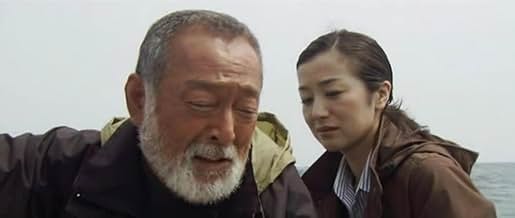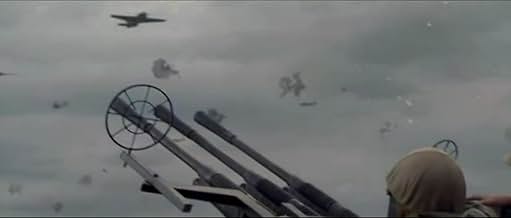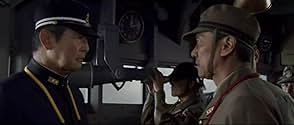Otoko-tachi no Yamato
- 2005
- 2h 25min
Ajouter une intrigue dans votre langueThe movie follows 3 Japanese friends from embarking on Yamato, the world's largest battleship, until it's sunk 3 1/2 years later on April 7, 1945 on it's way to Okinawa to stop American adva... Tout lireThe movie follows 3 Japanese friends from embarking on Yamato, the world's largest battleship, until it's sunk 3 1/2 years later on April 7, 1945 on it's way to Okinawa to stop American advance at the end of WWII.The movie follows 3 Japanese friends from embarking on Yamato, the world's largest battleship, until it's sunk 3 1/2 years later on April 7, 1945 on it's way to Okinawa to stop American advance at the end of WWII.
- Réalisation
- Scénario
- Casting principal
- Récompenses
- 6 victoires et 7 nominations au total
- Atsushi
- (as Sosuke Ikematsu)
Avis à la une
The mission accomplished nothing but another one-sided slaughter of "obedient soldiers". This is the real tragedy of men educated for obedience. Germans and Japanese alike.
And they were killed with millions against overwhelming (and technically also superior) powers by an opportunistic and docile dictatorship, leaving behind millions of sorrowing wives and children which never saw much of their fathers.
Otoko-tachi no Yamato shows us the common Japanese soldiers as human beings. No propaganda at all, unlike so many US war movies.
Its counterpart was the German movie "Das Boot". The difference is that in Germany the process of showing World War II as it was started earlier than in Japan. Even the horrendous loss of the Wilhelm Gustloff (10.000 dead)has been shown in a movie on the German television recently. In Japan the horrors of WWII finally are being shown to the public. While Germany feels "very guilty" for many decades, this process in Japan not really has been started yet.
I am not racist nor nationalist. I also am not right wing. I oppose to any wars by any mean. But, I respect the men who fought for us and it is sad that we don't know much about the fact we are living on where these men protected.
I voted this as "5" for actors/actress are not that super... Theme song as the same... Understanding they did their best, but level of acting is miserable. The battle scenes are great.
Sometime it's too stereotype to illustrate the story (ie. Geisha & Japanese Gamble ... that's almost the all the Japanese movie does).
"Otoko-tachi no Yamato" is a dramatic movie based on the true story of the Battleship Yamato in World War II. This film gives an approach of Japanese relationship in war totally different from the stereotype of American and European movies of this genre that usually treat Japanese soldiers as cold blood killers detached from any emotions. In "Yamato!", the Japanese military are human beings, with beloved ones, families and comradeship between them, giving more credibility to the story. However, director Junya Sato exaggerates in the melodramatic subplots and in many moments the viewer has the sensation of watching a soap-opera instead of a drama. The final battle of Yamato is engaging and one of the best moments of this film. The music score is repetitive and boring and I personally did not like it. Last but not the least, the Shōwa period mentioned by Katsumi Kamio in one of his last lines literally means, in accordance with the Wikipedia, "period of enlightened peace", or Shōwa era, is the period of Japanese history corresponding to the reign of Emperor Shōwa (Hirohito), from December 25th, 1926 to January 7th, 1989. My vote is seven.
Title (Brazil): "Yamato"
This is a very good and moving film. For all of the clichés (is there a well worn plot device it doesn't have?) it does manage to touch the heart and the head. We really do care about the characters we see up on the screen, and what happens to them, death in a foolish adventure, moves us. At the same time we get to see the waste that is war and was the Japanese war effort in the final days of World War Two. Its made clear that the fight to the end mentality leaves no room for tomorrow. Its best expressed in a simple scene on the bridge of the ship. One of the officers is asked to explain the difference between chivalry, the Western code of war, and Bushido, the Japanese code. Bushido, he says is preparing for a death with no reward, Chivalry is trying to live a noble life. Its a difference that all of the men can see but which very few ever get the chance to live by. Even the survivors, the old man essentially telling the story, is haunted by the fact that he lived and everyone else died.As the film asks plainly, if we all die, who's going to be around to take advantage of our sacrifices? Its a question that needs to be asked in this age of suicide bombers. There is a great many other thematic threads running through this film that lift it out of the typical war movie pile.
The cast is top notch. They manage to take what is often a clichéd script and to infuse it with the power of reality. Modern sequences aside, you care for these people and you are moved by what happens to them. The tears that well up in the final modern scenes come from the fact that the cast of the war sections is so good that you carry over the emotion. I wish that the modern sequences had given the actors something to do other than simply push the story into action.
Technically the film is very impressive. The Yamato, is monster of a ship and its plain to see that great care was taken in recreating it. Its a beautiful movie to look at with the entire film having a wonderful sense of place and time. The two battle scenes are graphic in a way that I've never seen in a naval war film (if you don't like blood you may want to look elsewhere.) This is going to be something to rattle the windows with on DVD.
If the film has any real flaw thats its length. The film is about two and a half hours long and to be honest it probably could have been shorter. I was getting fidgety during some of it. Its not that its bad, its just that the films pace allows you too much time to dwell on some of the by the numbers construction of the plot so you just want the film to get to the next bit (what another tearful goodbye?). It doesn't kill the film, it just makes it hard to truly get lost in the story.
If you like war films, or good movies this is one to keep an eye out for. Just be ready to do a little digging since I'm not sure if this is going to get a regular release outside of Asia.
Though it praised the braveness of soldiers, it can't bear comparison with "Sink the Bismarck" (1960), in which the defeated Germany wined British's respect (It's ridiculous when a US veteran present his awedness to rival in the start and final of "Lorelei: The Witch of the Pacific Ocean" (2005)).
But this is not a historically narrative film. It also abandon the scanty criticism tradition of Japanese war movie before 90's. The tradition of vagueness of moral sense in Japanese movie is still there. No context was given to transmit the information about the cause to this tragedy, without which the sense of sacrifice to protect others is so pale. The script seemed to cater to the current civil circumstance. So this is a real "anniversary" movie within a predefined frame.
The cast were very good. Despite the unnaturalness of the plot corresponding to modern society, Tatsuya Nakadai is still my favorite actor. It's a pity that Japanese movie is losing its classic art orientation and international influence after the fade of masters directors.
The 3D effect is just so so, light is somewhat dim, and the color is always monotonously the hull's hue. Fortunately, the wave is no longer that appeared in old movie adopt the ship model. Music is better than "Lorelei: The Witch of the Pacific Ocean".
Le saviez-vous
- AnecdotesPart of the foredeck and port side of the Yamato were reconstructed to full scale for the exterior scenes. As the Japan Building Standards Act interfered with re-creating the ship's entire superstructure, images of a one-tenth scale model of the Yamato at its namesake museum in Kure were used in post-production.
- GaffesThe ship is seen firing salvos from its main batteries aimed at approaching US aircraft on several occasions, while lots of the crew are visible on deck, manning the light AA guns as well as performing other duties. While the big guns were in fact used fending off aircraft, at least during the last battle off Okinawa, the shock wave from the blast of the nine 460 mm barrels (the biggest ever on a warship) could kill or severely injure an unprotected sailor, it was therefore forbidden to remain on deck on such occasions.
- Citations
Mamoru Uchida: [Firing an AA gun defiantly as the ship sinks] I'm not done yet! My last throw!
Meilleurs choix
- How long is Yamato?Alimenté par Alexa
Détails
Box-office
- Montant brut mondial
- 39 287 114 $US
- Durée
- 2h 25min(145 min)
- Couleur
- Mixage
- Rapport de forme
- 2.35 : 1























